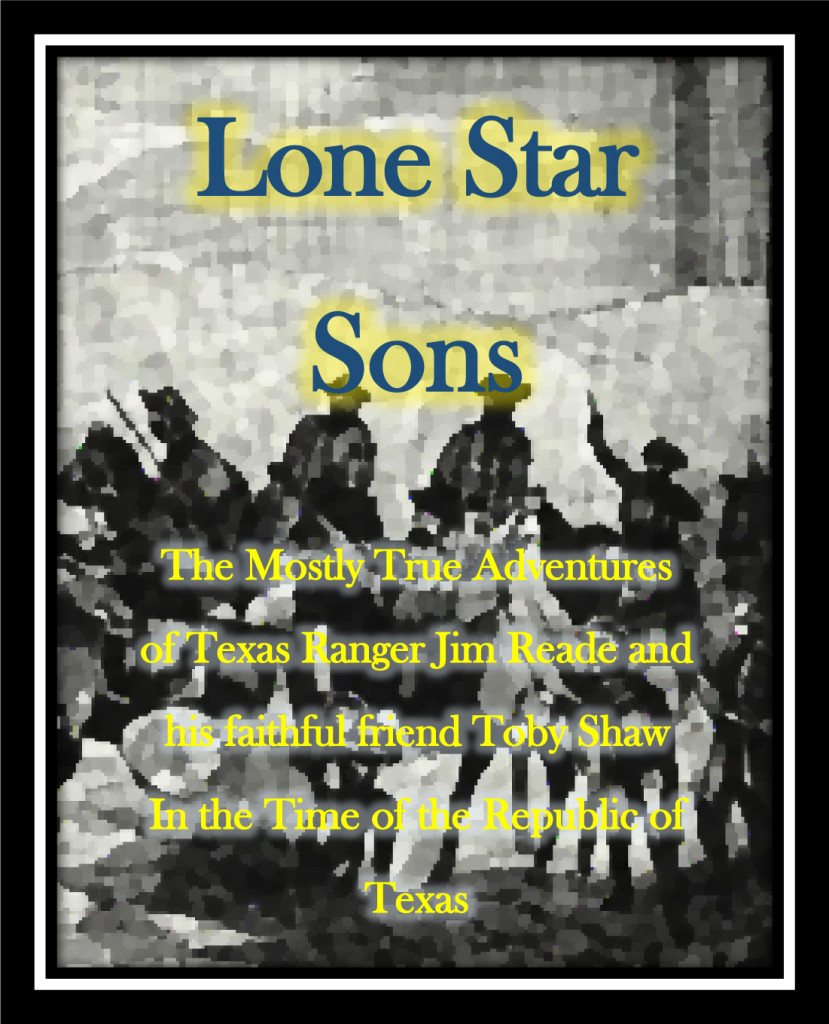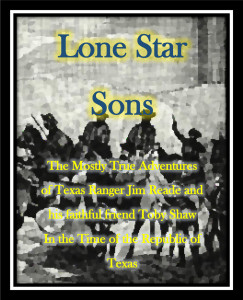 (The menace at Yoakum’s Landing is now obvious; Clay Huff has recognized his missing brothers’ saddle – and his cherished hunting dog – in the possession of the Yoakums – and Ethan Landry has panicked, at overhearing a plot by the Yoakums to murder him, now that Jim has made out a power of attorney allowing them to act in selling his property. Earlier chapters here, here, here and here.)
(The menace at Yoakum’s Landing is now obvious; Clay Huff has recognized his missing brothers’ saddle – and his cherished hunting dog – in the possession of the Yoakums – and Ethan Landry has panicked, at overhearing a plot by the Yoakums to murder him, now that Jim has made out a power of attorney allowing them to act in selling his property. Earlier chapters here, here, here and here.)
He grasped the front of Jim’s coat, babbling in unseemly hysteria.
“Calm yourself, Mr. Landry,” Jim snapped. “Who is going to kill you – and for what reason? You are among friends, and this is broad daylight! What has given you this notion?”
“The Yoakums,” Ethan Landry whispered. He seemed utterly undone, pale with terror. “For the property. They will kill me, and keep the money paid for it, using the written authority you drafted for me. I overheard the Squire and his son … they are plotting to kill me, and it is your fault! You have to help me!”
“Of course,” Jim grasped the younger man’s shoulder and shook it. “Pull yourself together, Landry – and stop acting like a spinster with a lizard in her petticoats. Now – come with us. Do you have a horse, at least?” The three of them headed towards the stable, with Toby in their wake – walking purposefully, but not at so rapid a pace as to draw unwanted attention.
“No,” Ethan shook his head. “I did … but I sold it to the Squire in payment for lodging here. How could I know they would prove such utter villains! Why didn’t anyone tell me! Why did you draw up that power of attorney? It is my undoing!”
“Because you asked it of me,” Jim answered, between his teeth. What to do now, with this sniveling fool hanging around his neck? He racked his mind for options, wondering how many of the guests at the Landing were in league with Squire Yoakum’s sinister purpose – and how many of them were truly innocent travelers. There was no time to seek for allies among them; Clay and Toby were the only ones he could trust without question. Once in the shelter of the barn, he turned to the others. “Clay – get your horse saddled, and I’ll get Toby’s mule. You know the Trace better than I. Take Mr. Landry with you and ride with all speed towards Tevis’s Bluff or any closer place of safety. You have your pistol with you? Good – I shall make a pretense of you feeling poorly.” To Toby, he added. “Mr. Shaw, I regret to say that I must ask for the loan of your coat and hat for Mr. Landry here. If they cannot be returned, I will purchase new to replace them.”
Toby shrugged, “It is of no matter to me, James.” Obligingly, he stripped off his own coat, and handed it to Landry, who regarded it with distaste, until Jim snapped,
“Put it on, Mr. Landry – it’s either freeze, or venture back to the house for your own.”
Clay, his face sent in grim lines, emerged from a stable-box leading his own horse, already bridled. It was the work of a moment to saddle it, fetch Toby’s mule and do likewise, although a Negro groom appeared as though they were halfway through this operation, a curry-comb in one hand, a bucket of oats in the other, and a protest on his lips.
“Seh, there ain’t no need…”
“There is,” Jim answered, and fixed the man with his most intent and purposeful gaze. “And you have not seen anything untoward in it. You have not seen anything at all, should your master or anyone else ask. Understand me?”
For a long moment, their gazes locked – and then the groom nodded slowly, in complete comprehension. “Seh … iff’n you ride out t’wards th’ bayeau, an’ follow the track through the woods, Massa an’ Miss Kate an’ all – they won’t see a t’ing.”
“Good,” Jim answered. The groom grinned briefly, his teeth a slash of white in his dark face. “And you did not see a thing at all.”
“No, seh,” the groom answered and took himself and his currycomb and oats into the farther recesses of the stable.
“You heard the man,” Jim said, when Clay and Landry were ready to ride. “The woodland track, until you can rejoin the trace. Return by the same way, as soon as you have deposited Mr. Landry in a place of safety. I will cover your absence as best as I can. I will say that you have been taken ill. When you return, come to the outside door of our chamber under cover of dark – tap three times, then three times again.”
“What then?” Clay took up a fistful of reins. “I do not relish leaving you in this den of treacherous serpents … since it was my concern which brought you here.”
“Don’t worry about me,” Jim replied. “Mr. Shaw and I – we have been in tight places before, and likely will be in tight places again. Ride fast, Clay; bring aid as soon as you can. Then we will decide what course to take then. I do not think Squire Yoakum will be able to deny the evidence of bones in his meadow, or your brother’s dog under his roof – let alone the evidence of Mr. Landry here.”
“I cannot testify!” Ethan Landry squeaked. Jim and Clay regarded him with the same degree of distaste. “I am wanted for murder in Alabama, having killed a man in a duel…”
“Then play the part of a man, you bleating fool,” Clay snarled. “You are not in Alabama any more – a notch on your dueling pistol is a recommendation here.”
Jim and Toby strolled from the stable by the wide entrance door visible to the house, making an elaborate show of disinterest in the quiet patter of hoof-falls that rapidly diminished out of the other end of the Yoakum’s stable. Toby, lagging half a step behind as was fitting in the pretense of being a servant, kept his voice a little above a whisper.
“What do you plan now, James?”
“On the pretext of Clay being indisposed, I intend to remain here a few days longer,” Jim answered. “Or as long as it takes to get a second look at that field, without arousing suspicion. I don’t imagine there’s anyone here at the Landing that we can trust, not even the servants. If the Yoakum’s neighbors fear and dislike them, I imagine the slaves are terrified – and I certainly don’t blame them.”
“The day is cold,” Toby said, not appearing to feel any such thing with the brisk wind flattening this thin shirt against his shoulders. “While there is none about, let us take another look now.”
“May as well,” Jim agreed. With Clay and Landry safely away and no one among the Yoakums raising the alarm, this moment might be their only chance. The two of them retraced their steps towards the meadow. The wind among the pine branches shook down icy drops upon them both, and Jim thought of tears falling. No smoke without a fire – and the fire at Yoakum’s Landing burned insatiably, like a Moloch demanding constant sacrifices.
Toby led him to the waterside, first – yes, at first one might have almost thought those bleached white shapes were not bones, but the revealed dead roots of trees, scoured by the sun – but no roots were curved like those of a man’s ribs, as small and intricate as finger and backbones, or knobbed at either end like leg and arm-bones. And the rounded shapes of human skulls could not be mistaken for anything. Jim looked down from the top of the bank for a long moment.
“Either buried at the edge where the ground was soft or these are bodies dumped into the water and washed up later,” he ventured at last. Toby nodded. “The other servants did not speak so much of this,” he said, his face an inscrutable mask. “But they spoke of it as a bad place, haunted by the spirits of the dead. None of them would go here after dark, not under threat of death by their master, unless driven by the most awful threats. I think that must have been in play, James – Yoakum and his kind, they would sooner force others to their bidding.”
“What of the other places?” Jim asked. “You said that it looked as if the ground had been often disturbed … as in that place where the dog had been digging.”
“I think we should take a look at that first,” Toby answered somberly.
They looked for the spot in the tumbled meadow where Randall Hoff’s dog had dug, from which Miss Kate had bid Jim take the dog. Where the dog had come to sit vigil, the earth had been dug up the earth again and again. It was much softened and easy to shift with bare hands, and as Jim feared, the place revealed much. A short way down through it, Jim’s hand touched cloth, from which a vile odor of putrefaction came; the edge of a pair of trousers and the corroded leather of boot-tops. Jim rose from the side of that rude grave and remarked softly to no one in particular,
“Poor faithful Gem – I think we have found his master.” More »


Recent Comments